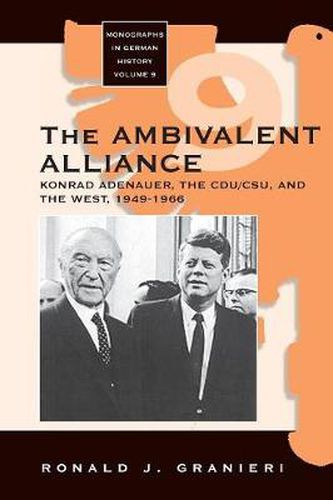Readings Newsletter
Become a Readings Member to make your shopping experience even easier.
Sign in or sign up for free!
You’re not far away from qualifying for FREE standard shipping within Australia
You’ve qualified for FREE standard shipping within Australia
The cart is loading…






This title is printed to order. This book may have been self-published. If so, we cannot guarantee the quality of the content. In the main most books will have gone through the editing process however some may not. We therefore suggest that you be aware of this before ordering this book. If in doubt check either the author or publisher’s details as we are unable to accept any returns unless they are faulty. Please contact us if you have any questions.
Whenever asked to name his most significant accomplishment as West Germany’s first Chancellor, Konrad Adenauer would invariably reply: The alliance with the free West. Scholars have echoed his assessment, citing the Federal Republic of Germany’s successful integration into the American-led West (Westbindung) as the key to its postwar economic and political recovery. Behind this simple success story, however,lies a much more complicated history: Adenauer and the CDU/CSU remained ambivalent about the ultimate relationship between Europe, Germany, and the United States within the West, torn between visions of Continental European integration based on Franco-German reconciliation and of an Atlantic community linking Europe and the Anglo-Saxons. These differences eventually erupted into a damaging public conflict between Atlanticists and Gaullists, which colored Adenauer’s last years and, after his retirement in 1963, led directly to the failure of his successor, Ludwig Erhard.
The opening of various personal and party archives over the past few years has now made the entire Adenauer Era accessible for historians. As one of the first efforts to use that material to re-examine existing conventional wisdom about the period, this book traces the roles of Adenauer and the CDU/CSU in shaping Westbindung. Adenauer emerges as a skilled and resourceful (if also mistrustful and devious) politician, and as a distinctly German statesman, maneuvering between allies and adversaries to shape both the Western community and the German role in it, leaving a legacy that still influences contemporary German-American and European-American relations.
$9.00 standard shipping within Australia
FREE standard shipping within Australia for orders over $100.00
Express & International shipping calculated at checkout
This title is printed to order. This book may have been self-published. If so, we cannot guarantee the quality of the content. In the main most books will have gone through the editing process however some may not. We therefore suggest that you be aware of this before ordering this book. If in doubt check either the author or publisher’s details as we are unable to accept any returns unless they are faulty. Please contact us if you have any questions.
Whenever asked to name his most significant accomplishment as West Germany’s first Chancellor, Konrad Adenauer would invariably reply: The alliance with the free West. Scholars have echoed his assessment, citing the Federal Republic of Germany’s successful integration into the American-led West (Westbindung) as the key to its postwar economic and political recovery. Behind this simple success story, however,lies a much more complicated history: Adenauer and the CDU/CSU remained ambivalent about the ultimate relationship between Europe, Germany, and the United States within the West, torn between visions of Continental European integration based on Franco-German reconciliation and of an Atlantic community linking Europe and the Anglo-Saxons. These differences eventually erupted into a damaging public conflict between Atlanticists and Gaullists, which colored Adenauer’s last years and, after his retirement in 1963, led directly to the failure of his successor, Ludwig Erhard.
The opening of various personal and party archives over the past few years has now made the entire Adenauer Era accessible for historians. As one of the first efforts to use that material to re-examine existing conventional wisdom about the period, this book traces the roles of Adenauer and the CDU/CSU in shaping Westbindung. Adenauer emerges as a skilled and resourceful (if also mistrustful and devious) politician, and as a distinctly German statesman, maneuvering between allies and adversaries to shape both the Western community and the German role in it, leaving a legacy that still influences contemporary German-American and European-American relations.